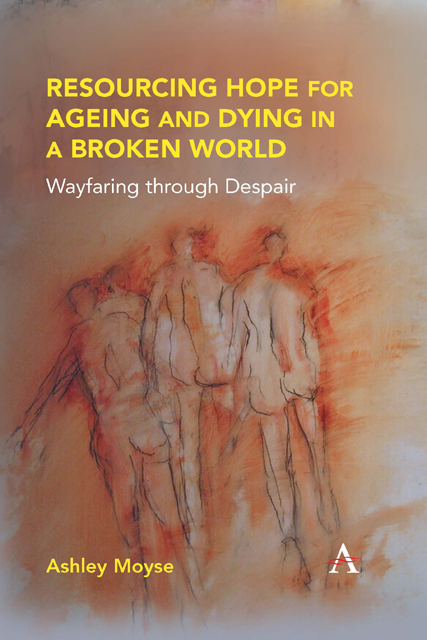Book contents
Introduction. Diagnosing Despair, Resourcing Hope
Published online by Cambridge University Press: 10 January 2023
Summary
She was 75 when she died. My mother experienced a haemorrhagic stroke at the end of the first week of March 2020. It was a medical emergency none of us had expected given that Mom was generally healthy, vibrant and strong. She was an icon of ‘successful ageing’.
At 75, that early Saturday morning, my mother awoke otherwise well, save for the persistent aches in her feet, knees and back that had become commonplace signs of her corporeality – discomforts and pains earned through her 45-year career, giving of herself for the care of others as a Registered Nurse (a vocation from which she had only recently retired). Moments later that same morning, calling out to my father that she could not see and that something was wrong, he corrected her stumbling about and laid her upon the nearby sofa. She exclaimed, ‘I’m scared!’ – and she said little else thereafter. Her healthful state was catastrophically altered in a moment. Her death followed eight days later. At 75, robust and active, my mother's death was unexpected – thwarting plans she and my father had made for their next several years together. At 75, my mother died.
Ezekiel Emanuel has written that he wants to die at 75. Seventy-five, according to Emanuel, is an ideal age to die – living too long thereafter becomes a mere record of losses. Such losses include, for Emanuel, diminished productivity and other functions of one's work–life or industrious leisure. The life experienced following such changes, forced onto persons by agerelated losses, is, as Emanuel suggests, meaningless. His desire is to avoid such cases of old age – and he challenges anyone who might suggest otherwise. Escape from such a life is his answer to the problem of old age.
While Emanuel is not likely to pursue assisted dying, or suicide by his own hand, Emanuel posits the depredations of ageing to become insufferable the longer persons live – suffering a life worse than death. A provocative claim that others might echo. But Emanuel has written without the experience of being 75 or any older than that. He is certainly, like all reading this sentence, ignorant of death too.
- Type
- Chapter
- Information
- Resourcing Hope for Ageing and Dying in a Broken WorldWayfaring through Despair, pp. 1 - 18Publisher: Anthem PressPrint publication year: 2022

